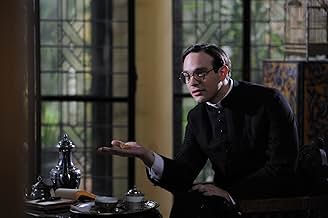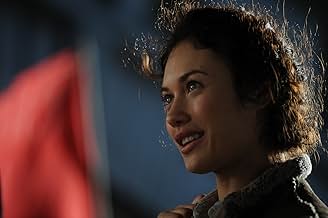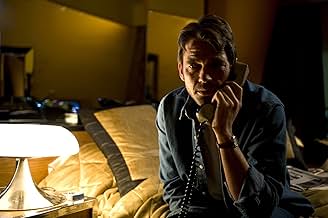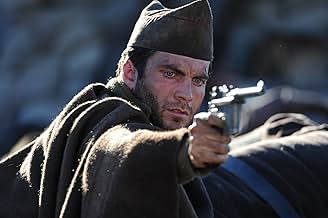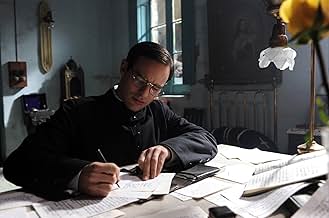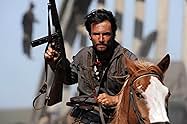IMDb-BEWERTUNG
5,7/10
5215
IHRE BEWERTUNG
Füge eine Handlung in deiner Sprache hinzuArising out of the horror of the Spanish Civil War, a candidate for canonization is investigated by a journalist who discovers his own estranged father had a deep, dark and devastating conne... Alles lesenArising out of the horror of the Spanish Civil War, a candidate for canonization is investigated by a journalist who discovers his own estranged father had a deep, dark and devastating connection to the saint's life.Arising out of the horror of the Spanish Civil War, a candidate for canonization is investigated by a journalist who discovers his own estranged father had a deep, dark and devastating connection to the saint's life.
- Auszeichnungen
- 2 Nominierungen insgesamt
Jordi Mollà
- Don José
- (as Jordi Mollá)
Juan Cruz Rolla Knight
- Young Josemaría
- (as Juan Cruz)
Empfohlene Bewertungen
A decent sketch. About war, friendship, courage and compromises, about faith, jealousy and parenthood. Decent, interesting for actors more than for story, obvious answer of Opus Dei against propaganda created by Da Vinci Code, it is a beautiful sketch of tragic events.
I found this film so pretentious in its aspiration and claims, so boring badly-acted and obviously propagandist in its execution to compel me to write my first review. (When I woke up after the big ZZzzz, I mean...) What it does is to paint a glorified history of the "Saint" and the birth of the Opus Dei, in pure ecclesiastic style, never mind historic accuracy.
It would still be all OK to me if the film had any cinematographic merits, if the acting was good, if dialogue was credible But it really isn't (e.g., "I wasn't allowed to play with Jose Maria anymore, my father thought poverty was contagious... My dad had more money, ... but Jose Maria had more dad." Excuse me! And also: "Like or not, most young men were celibate, at least as a priest you got paid for it". What? Excuse me!)
So, my advice is: really don't waste your two hours trying to stay awake during this: if you're interested in the Opus Dei and Escriva De Balaguer, find a more serious and reliable source, if you only want to go the movies, find a better film. This one should stay in the religious circles were it belongs, not in theatres.
It would still be all OK to me if the film had any cinematographic merits, if the acting was good, if dialogue was credible But it really isn't (e.g., "I wasn't allowed to play with Jose Maria anymore, my father thought poverty was contagious... My dad had more money, ... but Jose Maria had more dad." Excuse me! And also: "Like or not, most young men were celibate, at least as a priest you got paid for it". What? Excuse me!)
So, my advice is: really don't waste your two hours trying to stay awake during this: if you're interested in the Opus Dei and Escriva De Balaguer, find a more serious and reliable source, if you only want to go the movies, find a better film. This one should stay in the religious circles were it belongs, not in theatres.
Roland Joffé did not disappoint me with this film. I am a first generation spaniard and I find Joffé's portrayal of the Civil War honest and fair. The story is not engulfed by facts of history, it takes great care in exploring the mysteries of the characters' backgrounds.
On one side we have the historical figure of Jose Maria Escribar, tormented in his search for God and holding firmly to his ideals while submerged in a world of hatred and chaos. On the other Manolo, haunted by vengeance and confusion; fighting without a cause and desperately searching for something he can believe him, an answer to his inner chaos. Finally, Roberto, son of Manolo, must slowly unveil the terrible secrets his father has hidden within him and come to terms with finding out who the man that brought him up was.
The film explores the senseless nature of war and its consequences, the spiral of hatred that slowly engulfs men, the repentance for terrible mistakes and the struggle to forgive them. Each character follows a path filled with dilemmas and suffering at the end of which they must fight themselves and their dragons.
Technicalwise, the film is faultless. There is great care in every scene and as I can testify Joffé has done his homework. The detail to which the history and scenery of 1937 Spain has been recreated is astounding. Even so, the story talks about people, about soldiers; never about leaders or politicians. The film captures the essence of human conflict in its most raw form.
Do not expect an action packed war film. For those who have interest in the roots of Opus Dei, this film will not help you there. It deals with the repercussions of war and strife in people, it does not deal with the grander scale of things.
If nothing else this film will reassure you that war is and always will be a futile tragedy, all victories are Pyrrhic and the aftermath leaves bitter resentment and pain. An interesting perspective in this film is that of the many bystanders who are forced to choose the side they support and so they must be separated from loved ones forever. When a few want war, the rest have no say. As long as the hatred of so few is not buried, war will rise once more.
There Be Dragons is a deeply personal and spiritual film. It is very intense and reflects unapologetically the worst side of humanity. It is true to the title, where this film takes you, there be dragons.
On one side we have the historical figure of Jose Maria Escribar, tormented in his search for God and holding firmly to his ideals while submerged in a world of hatred and chaos. On the other Manolo, haunted by vengeance and confusion; fighting without a cause and desperately searching for something he can believe him, an answer to his inner chaos. Finally, Roberto, son of Manolo, must slowly unveil the terrible secrets his father has hidden within him and come to terms with finding out who the man that brought him up was.
The film explores the senseless nature of war and its consequences, the spiral of hatred that slowly engulfs men, the repentance for terrible mistakes and the struggle to forgive them. Each character follows a path filled with dilemmas and suffering at the end of which they must fight themselves and their dragons.
Technicalwise, the film is faultless. There is great care in every scene and as I can testify Joffé has done his homework. The detail to which the history and scenery of 1937 Spain has been recreated is astounding. Even so, the story talks about people, about soldiers; never about leaders or politicians. The film captures the essence of human conflict in its most raw form.
Do not expect an action packed war film. For those who have interest in the roots of Opus Dei, this film will not help you there. It deals with the repercussions of war and strife in people, it does not deal with the grander scale of things.
If nothing else this film will reassure you that war is and always will be a futile tragedy, all victories are Pyrrhic and the aftermath leaves bitter resentment and pain. An interesting perspective in this film is that of the many bystanders who are forced to choose the side they support and so they must be separated from loved ones forever. When a few want war, the rest have no say. As long as the hatred of so few is not buried, war will rise once more.
There Be Dragons is a deeply personal and spiritual film. It is very intense and reflects unapologetically the worst side of humanity. It is true to the title, where this film takes you, there be dragons.
Spanish/US co-production developing dramatic deeds during Spanish Civil War and the historic figure about Jose Maria Escriba De Balaguer . Enjoyable biographic movie well written and played , being compellingly directed by Roland Joffé . Arising out of the terror of the Spanish Civil War, a candidate for canonization is investigated by a reporter (Dougray Scott) who aware his own estranged father (Wes Bentley) had a deep, dark and devastating connection to the saint's (Charlie Cox) life .
This interesting film is full of compelling drama with love , passion and subsequent betrayal , touching scenes , historical events and good feeling . It is a simple , dramatic and intelligent portrait of a time when the Spanish people live taking on among them . This is an agreeable account of the survival of the human spirit against difficulties ; an epic portrayal of Faith, Forgiveness and Redemption . The movie is plenty of graphic , striking and memorable moments about timeless power of forgiveness and dictating a strong emotional response from the spectator , though some moments is unrealistic . Interesting and thought-provoking movie with evident excitement that can sometimes be undercut by inadequacies in the screenplay , being written and adapted by the same Roland Joffé . This moving picture results to be a breathtaking spectacle about dramatic consequences of Spanish civil war , including strong emotions , brooding dialog and a heartbreaking final . ¨There be dragons¨ or ¨Encontrarás Dragones¨ results to be other of the innumerable stories to deal with dramatic deeds regarding the Civil War background , a familiar theme about the global horrors of a fratricide war , impossible to forget to Spanish cinema . However the story needs a vibration more real than the one offered in this slow-moving and sometimes dull film . But anyway, its is compensated with the great performances from main cast as Charlie Cox as Josemaría Escrivá , Wes Bentley as Manolo Torres as Dougray Scott as Roberto Torres as Rodrigo Santoro as Oriol , Olga Kurylenko as Ildiko and sensational support cast , mostly Spanish , such as Unax Ugalde , Ana Torrent and Jordi Molla , interpreters who provided a considerable boost to the result . Furthermore , a spotless pictorial cinematography by Gabriel Beristain and a willingness , almost perfect of the elements of each shot , every sequence, every space .
The film develops an intrigue by means of flashbacks and dealing with Jose Maria Escriba De Balaguer's life . The events were the following : during the Spanish Civil War , Escrivá was hidden in a psychiatric sanatorium and fled from Madrid, which was under republican control, via Andorra and France, to the city of Burgos, held by the nationalist forces of General Francisco Franco. After the war ended in 1939 with Franco's victory, Escrivá was able to resume his studies in Madrid and complete a doctorate in law. His principal work was the foundation, government and expansion of Opus Dei.
The motion picture was well directed by the British Roland Joffé , being realized in academic style and general coldness , filmed in his usual formal and stylistic scholarship , without leaving a trace the thought-provoking issues , in terms of dramatic and narrative excitement . He is a good filmmaker mainly of epic subjects . After a long career filming for television , he made his movie debut in a big way with ¨The killing fields¨ winner of three Oscar and dealing with madness and atrocities committed by humans , Joffe's usual theme. ¨The mission¨, one of his greatest hits , had Palme d'or at Cannes , a graphic monument to Portuguese oppression in South-America , but Joffe has not quite held his place at the top level . He subsequently directed ¨Fat Man and Little Boy¨ referring to two atomic bombs dropped by America on Japan . Joffe's meagre output for the cinema makes it all the more surprising that he has turned out three splendid films and several others near-disasters such as ¨The scarlet letter¨, ¨Captivity¨, and ¨You and me¨. Rating ¨Encontraras Dragones¨ : Better than average , worthwhile watching .
This interesting film is full of compelling drama with love , passion and subsequent betrayal , touching scenes , historical events and good feeling . It is a simple , dramatic and intelligent portrait of a time when the Spanish people live taking on among them . This is an agreeable account of the survival of the human spirit against difficulties ; an epic portrayal of Faith, Forgiveness and Redemption . The movie is plenty of graphic , striking and memorable moments about timeless power of forgiveness and dictating a strong emotional response from the spectator , though some moments is unrealistic . Interesting and thought-provoking movie with evident excitement that can sometimes be undercut by inadequacies in the screenplay , being written and adapted by the same Roland Joffé . This moving picture results to be a breathtaking spectacle about dramatic consequences of Spanish civil war , including strong emotions , brooding dialog and a heartbreaking final . ¨There be dragons¨ or ¨Encontrarás Dragones¨ results to be other of the innumerable stories to deal with dramatic deeds regarding the Civil War background , a familiar theme about the global horrors of a fratricide war , impossible to forget to Spanish cinema . However the story needs a vibration more real than the one offered in this slow-moving and sometimes dull film . But anyway, its is compensated with the great performances from main cast as Charlie Cox as Josemaría Escrivá , Wes Bentley as Manolo Torres as Dougray Scott as Roberto Torres as Rodrigo Santoro as Oriol , Olga Kurylenko as Ildiko and sensational support cast , mostly Spanish , such as Unax Ugalde , Ana Torrent and Jordi Molla , interpreters who provided a considerable boost to the result . Furthermore , a spotless pictorial cinematography by Gabriel Beristain and a willingness , almost perfect of the elements of each shot , every sequence, every space .
The film develops an intrigue by means of flashbacks and dealing with Jose Maria Escriba De Balaguer's life . The events were the following : during the Spanish Civil War , Escrivá was hidden in a psychiatric sanatorium and fled from Madrid, which was under republican control, via Andorra and France, to the city of Burgos, held by the nationalist forces of General Francisco Franco. After the war ended in 1939 with Franco's victory, Escrivá was able to resume his studies in Madrid and complete a doctorate in law. His principal work was the foundation, government and expansion of Opus Dei.
The motion picture was well directed by the British Roland Joffé , being realized in academic style and general coldness , filmed in his usual formal and stylistic scholarship , without leaving a trace the thought-provoking issues , in terms of dramatic and narrative excitement . He is a good filmmaker mainly of epic subjects . After a long career filming for television , he made his movie debut in a big way with ¨The killing fields¨ winner of three Oscar and dealing with madness and atrocities committed by humans , Joffe's usual theme. ¨The mission¨, one of his greatest hits , had Palme d'or at Cannes , a graphic monument to Portuguese oppression in South-America , but Joffe has not quite held his place at the top level . He subsequently directed ¨Fat Man and Little Boy¨ referring to two atomic bombs dropped by America on Japan . Joffe's meagre output for the cinema makes it all the more surprising that he has turned out three splendid films and several others near-disasters such as ¨The scarlet letter¨, ¨Captivity¨, and ¨You and me¨. Rating ¨Encontraras Dragones¨ : Better than average , worthwhile watching .
What a dirge of a movie. Trying to be an epic film about the Spanish War, the Catholic church and the unearthing of grave secrets...it really doesn't hit any of those points well.
Wusstest du schon
- WissenswertesThe title comes from the phrase "here be dragons" which was written on old maps to denote dangerous or uncharted areas.
- PatzerThe sub machine gun that the rebel leader Oriol takes from the wrecked combat car to pose with Ildiko is a Thompson M1 or M1-A1, as shown by the charging handle on the right and the simplified rear sight. This was not introduced until 1942, six years after the events in the movie.
- Alternative VersionenBecause of poor box-office performance in 2011, the film was re-edited and re-released in the USA in 2012, under the title "There Be Dragons: Secrets of Passion". This new version is shorter (106 minutes) and has a new music scored by Robert Folk.
- VerbindungenFeatured in Saint of the Ordinary: The Making of There Be Dragons (2011)
Top-Auswahl
Melde dich zum Bewerten an und greife auf die Watchlist für personalisierte Empfehlungen zu.
- How long is There Be Dragons?Powered by Alexa
Details
- Erscheinungsdatum
- Herkunftsländer
- Offizielle Standorte
- Sprache
- Auch bekannt als
- Dragon Fighter
- Drehorte
- Produktionsfirmen
- Weitere beteiligte Unternehmen bei IMDbPro anzeigen
Box Office
- Budget
- 36.000.000 $ (geschätzt)
- Bruttoertrag in den USA und Kanada
- 1.069.334 $
- Eröffnungswochenende in den USA und in Kanada
- 705.537 $
- 8. Mai 2011
- Weltweiter Bruttoertrag
- 4.372.642 $
- Laufzeit2 Stunden 2 Minuten
- Farbe
- Sound-Mix
- Seitenverhältnis
- 2.35 : 1
Zu dieser Seite beitragen
Bearbeitung vorschlagen oder fehlenden Inhalt hinzufügen









